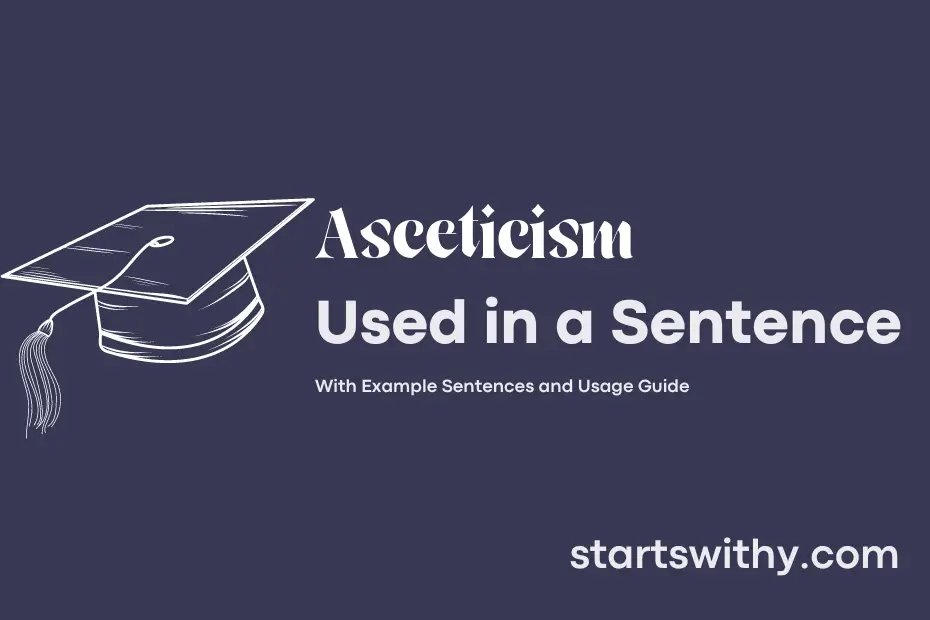Asceticism is a practice of strict self-discipline and abstinence from worldly pleasures, often undertaken for spiritual or religious reasons. This lifestyle focuses on simplicity, self-denial, and minimalism to achieve a higher state of consciousness or connection with the divine.
Many ascetics live a life of minimal material possessions and adhere to rigorous routines of meditation, fasting, and contemplation. The practice of asceticism varies across cultures and religions, but its core principles of simplicity and renunciation remain consistent.
7 Examples Of Asceticism Used In a Sentence For Kids
- Asceticism is when a person lives simply without many things.
- Some people practice asceticism by eating only simple foods.
- A person who practices asceticism might live in a small house.
- Asceticism means living without fancy clothes or toys.
- People who practice asceticism focus on being happy with less.
- An important part of asceticism is being content with what you have.
- Those who follow asceticism try to live a peaceful and simple life.
14 Sentences with Asceticism Examples
- Asceticism is often associated with spiritual practices and can be observed in the lives of saints and monks.
- Many college students in India choose to practice asceticism during exam time by avoiding social gatherings and focusing solely on studying.
- Incorporating a bit of asceticism into your daily routine can help improve your self-discipline and focus.
- Some students find solace in the simplicity of asceticism when faced with overwhelming academic pressure.
- Practicing a form of asceticism such as intermittent fasting can help students maintain a healthy lifestyle amidst busy schedules.
- Balancing social activities and academic responsibilities can be challenging, but the principle of asceticism can help students prioritize their goals.
- Engaging in activities that promote asceticism, like meditation and yoga, can help students manage stress and anxiety effectively.
- Adopting a minimalist lifestyle is a form of asceticism that some college students in India find beneficial for decluttering their minds and living spaces.
- Understanding the value of asceticism can help students cultivate a sense of gratitude for the simple things in life.
- Learning to appreciate the beauty of nature through hikes and camping trips can be a form of asceticism that resonates with many college students.
- Exploring the concept of asceticism through artistic expression can provide students with a unique outlet for self-reflection and creativity.
- Integrating moments of asceticism into your daily routine, like unplugging from technology, can enhance your overall well-being.
- Embracing the practice of asceticism can help students develop a stronger sense of willpower and determination to achieve their academic goals.
- Some students find comfort in the discipline of asceticism as a way to navigate the complexities of modern college life in India.
How To Use Asceticism in Sentences?
To use Asceticism in a sentence, beginners can follow these steps:
-
Understand the Meaning: Asceticism refers to a lifestyle characterized by self-discipline, austerity, and abstention from worldly pleasures or material possessions.
-
Identify the Context: Think of a scenario where someone is living a simple and disciplined life, detached from material possessions or indulgences.
-
Construct a Sentence: Choose a subject (the person practicing asceticism), a verb, and an object (what they are abstaining from or focusing on). For example, “John embraced asceticism by living in a humble monastery and meditating daily.”
-
Clarify the Message: Ensure the sentence clearly conveys the idea of a disciplined and simple lifestyle that asceticism represents.
-
Practice Using it: Try writing different sentences using asceticism in various contexts to become more familiar with the word.
Remember that using asceticism in a sentence may vary depending on the context and desired message. With practice and understanding, beginners can effectively incorporate this word into their vocabulary.
Conclusion
In conclusion, asceticism, a practice of extreme self-discipline often characterized by simplicity and avoidance of indulgence, has been evident in various historical and religious contexts. From the ascetic lifestyle of monks in secluded monasteries to the strict dietary restrictions of certain cultures, asceticism manifests in diverse forms. These sentences demonstrate its presence in different aspects of life, highlighting the emphasis on self-control and detachment from worldly pleasures.
Through these examples, the varied interpretations and applications of asceticism become apparent, showing its significance in promoting spiritual growth, discipline, and resilience. Whether practiced for religious devotion, philosophical beliefs, or personal development, asceticism continues to shape individuals’ approach to life, guiding them towards a more disciplined and introspective existence.



